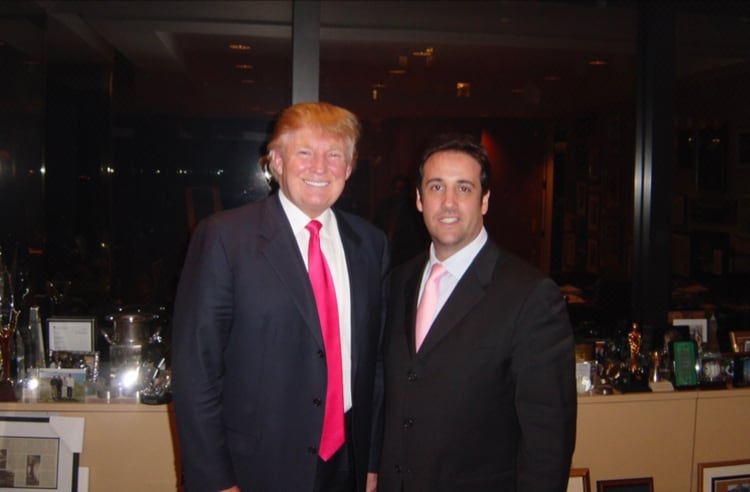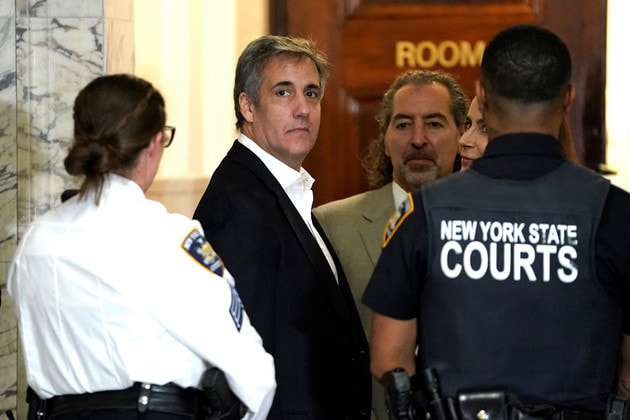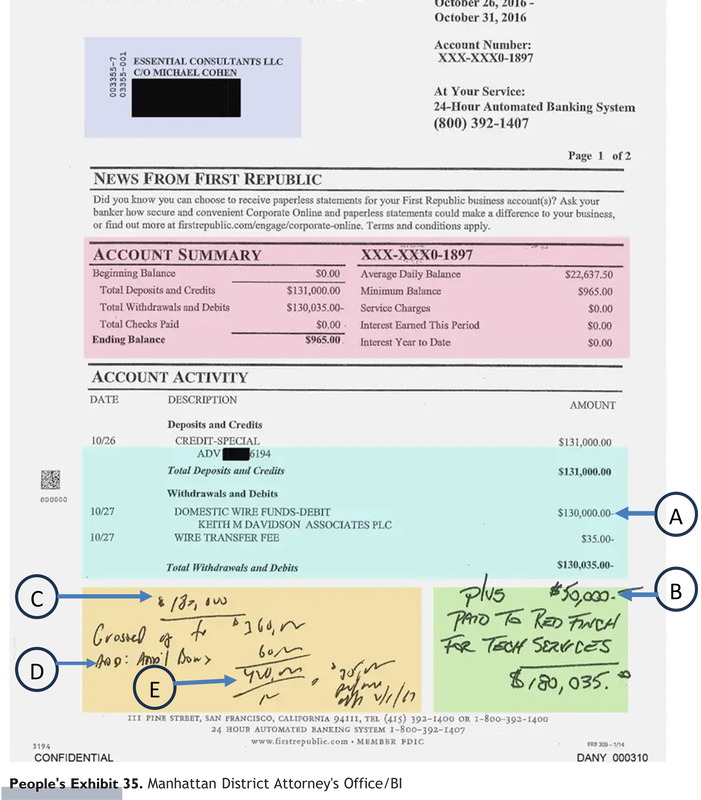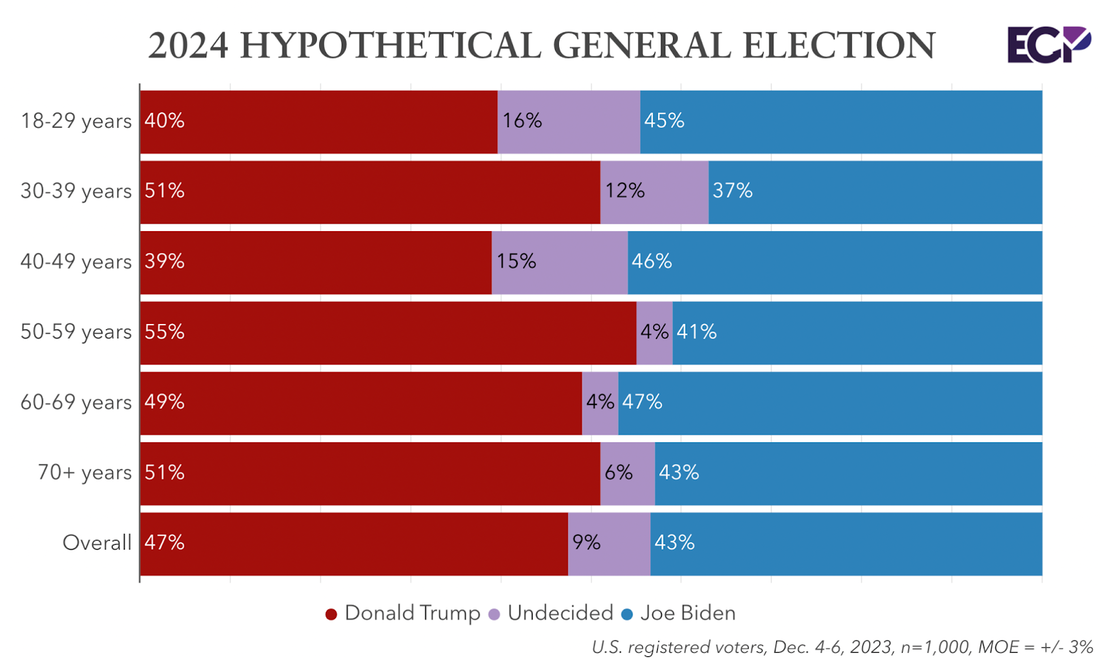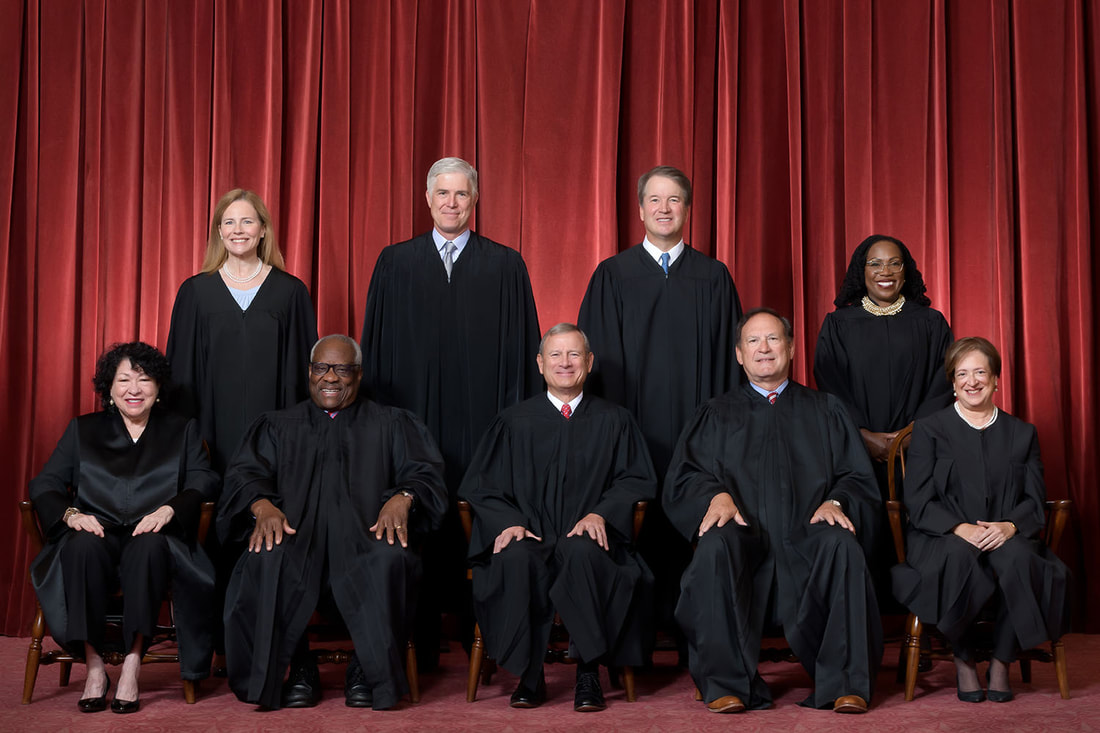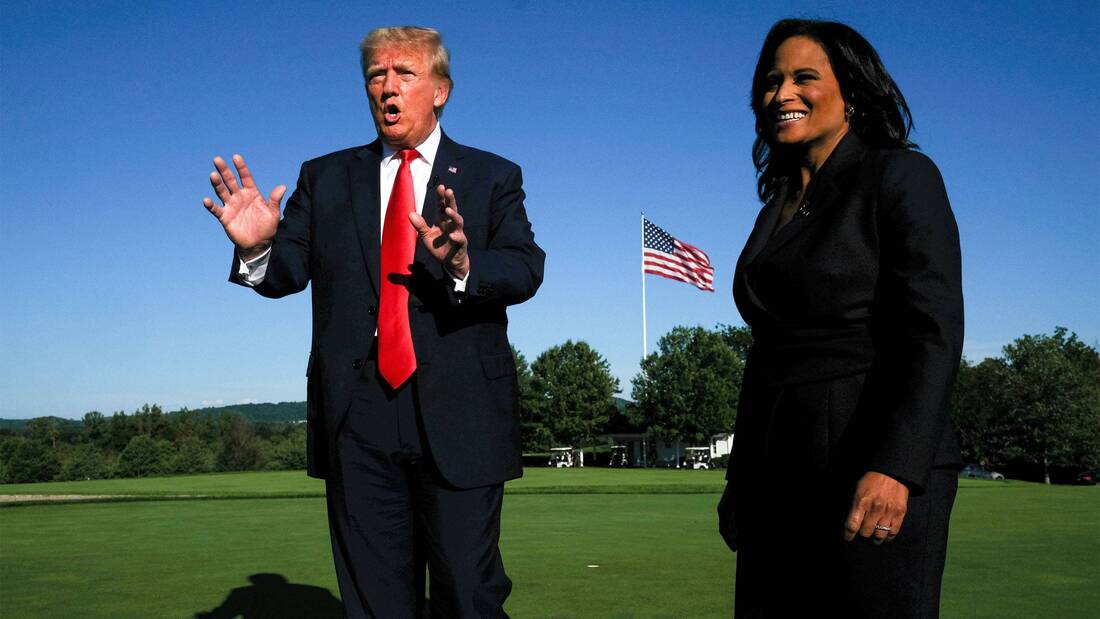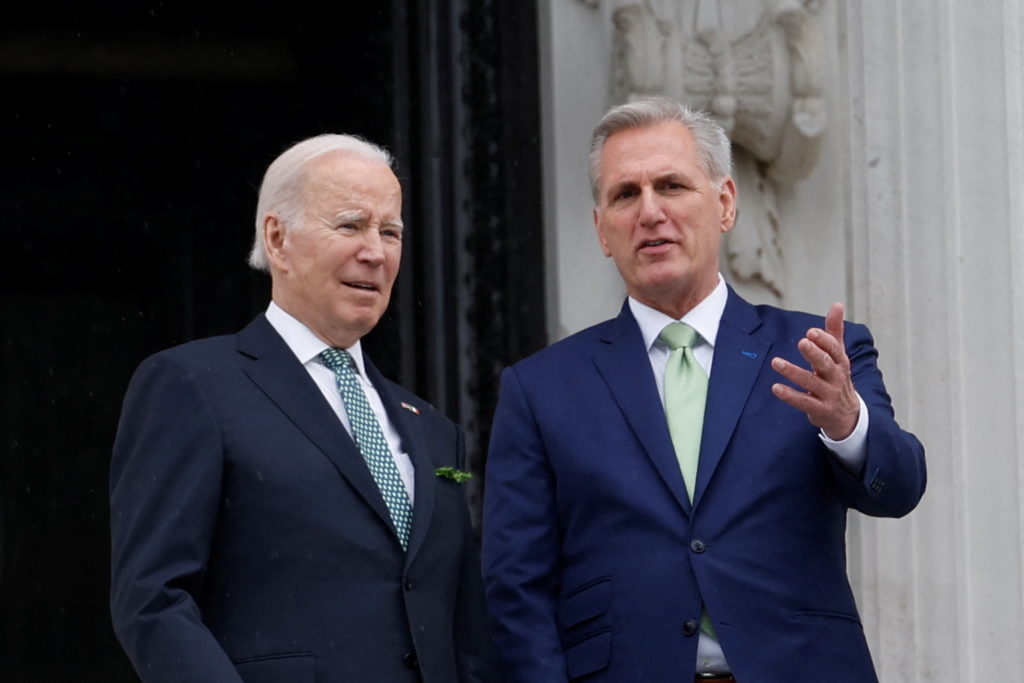Alternatively, Trump's defense team claims that the entire $420,000 represents Cohen's salary for legal services. Their most compelling support for this claim is that it is approximately what his salary was the previous year. There is a severe problem with the defense's argument. If $420,000 is Cohen's salary, then Cohen could not have stolen $30,000. One cannot steal one's salary! Yet, the defense is contradicting their primary defense of Trump.
|
A critical element in Donald Trump's hush money trial is whether the $420,000 Trump paid to Cohen in twelve $35,000 checks was Cohen's salary or reimbursement for money Cohen paid on behalf of Trump. According to the prosecution, these twelve checks were mostly a reimbursement for money that Cohen had paid to keep porn star Stormy Daniels quiet about her sexual encounter with Trump. The prosecution's proof for explaining the money is a worksheet (Exhibit 35) with handwritten notes by Trump's Chief Financial Officer, Alan Weisselberg. This note shows that (A) $130,000 was wired to Keith Davidson Associated on 10/27 (Stormy Daniels' attorneys); (B) $50,000 paid to Red Finch for Technical Services; (C) $180,000 "grossed up" to $360,000; (D) $60,000 for a bonus; and a total of (E) $420,000. Cohen says that he paid Red Finch $20,000 for phony poll results for Trump, although he claimed that these services to Red Finch cost $50,000. In other words, Cohen admitted to stealing $30,000 from Trump. It is also important to note that the prosecution and Cohen maintain that $180,000 is "grossed up" or doubled so that Cohen would not "lose" $90,000 to taxes because Cohen was in the 50 percent tax bracket. The note does not show a $60,000 bonus for Cohen being grossed up, presumably because employers do not pay employee taxes.
Alternatively, Trump's defense team claims that the entire $420,000 represents Cohen's salary for legal services. Their most compelling support for this claim is that it is approximately what his salary was the previous year. There is a severe problem with the defense's argument. If $420,000 is Cohen's salary, then Cohen could not have stolen $30,000. One cannot steal one's salary! Yet, the defense is contradicting their primary defense of Trump.
0 Comments
By Guest Contributors: Burton Blistein and Brigitte Savage It is clear that Donald Trump, not President Biden, controls many of our most critical domestic and international decisions. The border issue cannot be solved because Trump does not want it solved. We cannot supply essential aid to Ukraine because Trump does not want it supplied. If in the future Ukraine is funded such funding must, according to Trump, take the form of a loan. (The nation defending the West with its blood and territory must pay for that privilege!) The Senate cannot appropriate funds unless the House agrees; and the House is clearly subservient to Trump. Trump does not control the presidency, but the president cannot act without the cooperation of the branches that Trump does control. Biden confirmed this and Trump’s supremacy when he twice asked Trump’s assistance to resolve the border issue.  The Supreme Court as composed June 30, 2022 to present. Front row, left to right: Associate Justice Sonia Sotomayor, Associate Justice Clarence Thomas, Chief Justice John G. Roberts, Jr., Associate Justice Samuel A. Alito, Jr., and Associate Justice Elena Kagan. Back row, left to right: Associate Justice Amy Coney Barrett, Associate Justice Neil M. Gorsuch, Associate Justice Brett M. Kavanaugh, and Associate Justice Ketanji Brown Jackson. Credit: Fred Schilling, Collection of the Supreme Court of the United States To this we must add that the Supreme Court has surrendered to Trump by refusing to address the genuine constitutional issues that would prohibit his candidacy and by deliberately delaying a decision that would enable Trump’s trial for violating the constitution to proceed before the election. The Justices redefined the case before them so that the issue became whether Colorado was entitled to bring it, rather than whether Trump’s rebellion against the Constitution prohibited his candidacy, as in fact it clearly did. Both liberal and conservative justices appear to have concurred in this strategy. Their argument that such a momentous decision should be left to the electorate is contradicted by their decision to slow-walk Trump’s immunity claim and so possibly defer his trial until after the election, thus depriving the voters of the critical information they would need to choose wisely. How are we to account for such behavior, which appears to transcend political and philosophical differences and violates common sense?
Trump has carefully recruited and nurtured an army of thugs committed to making life impossible for those who oppose him. They have intimidated members of Congress, many of whom privately admit that they fear for themselves and for their families. Trump has made it a practice to include the judiciary among those certain victims. Members of the Supreme Court must have been aware that, should they prevent Trump’s candidacy as the Constitution required, they would have been forever subject to the vicious predations of his devoted minions, and indeed would become their primary targets. There was, accordingly, virtually no chance that they would have denied his candidacy. Trump subsequently thanked the Justices publicly, indicating that because of their submission they need not fear his wrath or that of his followers. The Court’s unnecessary delay adjudicating Trump’s claim of Presidential immunity figures as another similarly motivated submissive gesture on Trump’s behalf. The Court thus committed us to a course in which the very rule of law is threatened while itself affording the chief example of why and how this occurred. One must assume that like considerations, plus perhaps hope of advancement, dictate Judge Cannon’s otherwise inexplicable behavior. In sum, with respect to the issues that concern him Trump effectively controls two of the three branches of government. Those who warn us that our votes will determine whether we will live in a democracy in the future or in a dictatorship are therefore wrong. That “future” is our present. The press actively contributes to this sorry state of affairs when they speak of the “new normal” or use similar terms to describe Trump’s depredations. They thus “train” the public to accept those abominations and ignore their truly horrific consequences. The gravity of our current situation requires first, that the government and press acknowledge it, and second decisive action by Biden to restore the balance. He should not seek accommodation with Trump or those beholden to him. He should use his remaining powers to shut down the border if that proves necessary and his drawdown authority to immediately channel essential weapons to the Ukrainians. He must demonstrate that he, not Trump, is in charge and seek every opportunity to do so. Currently, the “optics” are very bad for Biden. Notwithstanding Congress’s delay in acting, he has managed to continue to supply Israel with the weapons to kill thousands yet has been languid in supplying the most advanced weapons for Ukraine to defend itself against an unprovoked attack, resulting in the deaths of thousands. Trump has deliberately created a climate of fear. To this he owes much of his power. We urge a task force devoted to dealing specifically with Trump’s domestic terrorism, which is much more diffuse, prevalent, transparent, and dependent upon the internet than that of foreign adversaries. We hear a great deal about threats to individuals by Trump’s followers, but very little about the apprehension of those who make such threats. That must change if we are to restore confidence in the rule of law. Should Trump lose the election we can expect a significant increase in the nefarious activity of his minions. We must be prepared for this. A task force such as that described would clearly help and define and make explicit for the voters the importance of the issues confronting them. At the beginning of 1980, Ronald Reagan, the challenger, trailed Jimmy Carter in the presidential race. However, the overthrow of the Shah of Iran by radical Islamists led to an oil shortage. The results on the U.S. economy were brutal: a 40 percent jump in U.S. gas prices, gas shortages, long lines, and an inflation rate of 13.3 percent. These events helped lead to the most severe recession since the Great Depression and the onset of stagflation (slow economic growth and high unemployment). The American public was unhappy, as Carter's falling poll numbers showed. Republicans began savoring their expected takeover of the White House. Surprisingly, as the polls turned in Reagan's favor, Republicans became more concerned about the possibility of some event derailing their expected victory. Reagan's campaign manager and trusted advisor, Bill Casey, was apprehensive about an "October Surprise," an unexpected event redounding to Carter's advantage. Casey believed that the failure of the Carter administration to secure the release of the hostages was mainly responsible for Carter's drop in the polls. Casey feared that an October Surprise, like Carter securing the release of the hostages, could rejuvenate the Carter campaign and lead to Carter's victory. Casey was determined to nip any potential October surprise in the bud.  Ronald Reagan and his presidential-campaign chairman, William Casey, in June 1980. PHOTO: ASSOCIATED PRESS Ronald Reagan and his presidential-campaign chairman, William Casey, in June 1980. PHOTO: ASSOCIATED PRESS In the summer of 1980, Casey devised a three-part plan for preventing an October Surprise. The first part consisted of establishing a committee of foreign-policy experts to monitor global events, especially those related to Iran, and alert the Reagan campaign to develop mitigation measures. The second part of the plan involved sending John Connolly, a former Texas governor, and his mentee, Ben Barnes, to Jordan, Syria, Lebanon, Saudi Arabia, Egypt, and Israel to relay a message to the Iranian government. Casey wanted these governments to let the Iranians know that they could expect a better deal for releasing the hostages from Reagan than from Carter. Connolly and Barnes, as directed, delivered Casey's message to the Middle East leaders. And the month after returning to Texas, they met with Casey for a debriefing. The third part of Casey's plan was to meet in Madrid with Ayatollah Mehdi Karrubi, a high-ranking representative of the Iranian government. Various sources reported that Casey told Karrubi that Iran would get a better deal for the hostages from Reagan than from Carter. However, these accounts of a Madrid meeting were discounted because various investigators believed that Casey was at a conference in London. Recently, one investigator found evidence showing that Casey was in Madrid for one day before arriving at the London conference. Although Carter has received credit for negotiating the release of the embassy hostages, they were not released until one hour after Reagan was sworn in as president. As a result, some observers suspected that the Reagan campaign had interfered with Carter's negotiations for the release of the hostages. To counter the suspicious timing of the hostage's release, Reagan's defenders cited two reasons. First, as governor, Reagan was well-known for being a hands-off manager who delegated the execution of his plans. Thus, it seemed reasonable that he would be unaware of all the activities other team members might have implemented without his knowledge. Casey's relationship with Reagan, an old friend, and his current campaign manager, lent support to Reagan, letting Casey run things. However, while Reagan could be oblivious about those issues in which he had little interest, he was dogged about those things he considered critical. (The extent to which Reagan was actively involved in the problems he was concerned about was seen in the Contra Affair.) Second, Reagan was on a path to winning; it would have been counterproductive to do anything that might have prevented the campaign from winning the election. Casey, however, was vociferous in his belief that if Carter could engineer the release of the hostages, Carter could still defeat Reagan. And if Casey believed this, it is unlikely that Reagan would have had a different opinion. Reagan's lead in the polls had been up and down, although Carter was trailing by the summer of 1980. Why would Ragan gamble on making a deal with the Ayatollah? Despite those concerns, Reagan had another consideration. This run for president was Reagan's third; he was 69 years old. He would almost certainly not have another opportunity to run for president again. Also, Reagan's victory would help seal right-wing supremacy in the Republican Party.  Blindfolded US hostages and their Iranian captors outside the US embassy in Tehran (Reuters) Blindfolded US hostages and their Iranian captors outside the US embassy in Tehran (Reuters) Casey and Connolly's message to the Iranians was that they would receive a better deal from Reagan than Carter. Although this message would have resonated with Khomeini because of his hatred for Carter (Carter had supported the Shah). Reagan also promised to offer more to release the hostages than Carter. Whatever Reagan was promising would eventually be paid by the American people. Iran was fighting a deadly war against Iraq and needed U.S. arms and replacement parts for the U.S.-equipped military the Shah had built. Because of the embargo Carter had placed on the direct sales of military equipment to Iran, Israel became a prime source for the Iranians. Israel could supply U.S. equipment, and Israel was more than willing to act as a middleman. Israel hoped to improve relations with Iran and saw Iraq as a more significant threat.
Any agreement between the Reagan campaign and Iran would involve commitments. Regardless of whether Reagan was involved, any commitments made to Iran would be a deal the Iranians could pressure the U.S. to keep. If Reagan had been engaged, those commitments to Iran would have been more likely fulfilled. Reagan, for example, publicly pledged to enforce the arms embargo against Iran. Even if Reagan had not been initially involved in dealing arms to Iran, it would have been nearly impossible to have fulfilled the agreement without letting him know. Reagan had promised that the U.S. would never ransom Americans held by terrorists. Yet, Reagan threatened to "call off the Iranian deal" unless the hostage, Cynthia Dwyer, the wife of Richard Allen, National Security Director's college roommate, was released by the Iranians, along with an Iranian American Rockwell International employee and three British missionaries. Ronald Reagan was directly involved in an arms-for-hostages negotiation despite his pledge not to engage in such swaps. The circumstances of both the release of the embassy hostages and Cynthia Dwyer are strong circumstantial evidence that Reagan was involved in both arms-for-hostages deals. Reagan's inner circle members ensured his arms transfer participation was hidden. For example, there was evidence that Casey had met in Madrid with representatives of the Iranian government. This information was hidden and only discovered recently. Shielding Casey, Reagan's close friend, also shielded Reagan. Within three months of Reagan's inauguration, his Secretary of State, Alexander Haig, gave implicit permission for Israel to ship U.S.-made military spare parts and fighter planes to Iran. It was understood that the U.S. would replace the depletion of U.S. arms from Israel's stockpile to Iran. Later, Haig denied that he had permitted the sale of arms to Iran. National Security Director Richard Allen claimed that Reagan's order to "call the deal off" if Cynthia Dwyer was not released referred to the Algiers Accords, an agreement between Iran and the U.S. negotiated by Carter. These Accords called for the release of Iranian funds held by the U.S. in return for the release of the hostages seized in the U.S. Embassy. Not only had the embassy hostages already been released, but it was also the position of the Reagan administration that the Accords were, in effect, paying ransom for hostages. The Reagan administration had foresworn any deals made with terrorists for the release of hostages. Reagan could ignore his promises when he chose. Despite public pronouncements supporting a ban on arms sales to Iran and negotiations with terrorist groups like Hezbollah, the evidence seems clear that Reagan permitted arms to be sold to Iran through Israel. Another group of hostages was seized in 1984 by Hezbollah and included CIA Station Chief William Buckley, the Revs. Benjamin Weir, Lawrence Jenco, Peter Kilburn, David Jacobsen, Thomas Sutherland of American University, and Terry Anderson, an Associated Press correspondent. Reagan obtained the release of these hostages through arms sales to Iran. The Reagan administration's sales of arms to Iran while censuring Carter's efforts to free the embassy hostages and pledging to renounce such deals was undoubtedly hypocritical. Equally portentous, however, was the Reagan administration's discovery of the template for freeing hostages held by Iran by selling them arms. Indeed, Reagan's agreements with the Iranians may have led to additional hostages being seized. As a result of having this arms-for-hostages template, Reagan's National Security Council wound up obtaining the resources needed to subsidize a covert war against the socialist government of Nicaragua. Even before Reagan took office, he was convinced that the Carter administration's focus on human rights was misplaced. The new administration was confident that the Carter administration was allowing communism to take root in both Iran and throughout Latin America. Reagan was determined to reverse what he saw as a dangerous trend. The Reagan administration saw an opportunity in Iran. Fearing that the ongoing turmoil in Iran would provide an opening for Russia to exert its influence, Reagan agreed to improve relations with the Iranian government by selling its weapons. Iran, during the war with Iraq, needed heavier missiles. If the U.S. agreed to the sale, such U.S.-made missiles would be available through Israeli arms dealers. To ensure a U.S. agreement, the arms dealers offered the release of CIA station chief William Buckley. This offer and the Israeli government's urging convinced Reagan to give his final go-ahead. The U.S. sold missiles to Iran, although only one hostage, Reverend Benjamin Weir, was released. Another opportunity occurred because a left-leaning government took power in Nicaragua – the Sandinistas - and spurred a rebellion by the Contras. From the first days of his presidency, Reagan had been covertly aiding the Contras. As Reagan's aid increased, Congress reacted by imposing increasingly restrictive limitations on the assistance that Reagan could bring to bear. By 1983, Congress had passed the Boland amendments prohibiting the U.S. from providing any military or paramilitary aid to the Contras. Reagan's response was to seek money for the Contras from other countries despite acknowledging that such assistance might violate U.S. law. Reagan's respect for the law seemed porous when the law conflicted with his wishes. By May 1984, the National Security Director, Robert McFarlane, was able to obtain "humanitarian" funds from Saudi Arabia that, over the next eight months, would total $32 million. As military operations in Nicaragua increased and the need for aid grew, the Reagan administration, led by Colonel Oliver North and the NSC staff, struggled to keep the Contras supplied. Besides the logistical problems of secretly providing the arms for a war against the Nicaraguan Sandinistas, the cost of the war exceeded what the Saudis and other third parties provided. By December of 1985, North told the Israeli officials with whom he was selling weapons to Iran that he intended to use profits from the sale to fund the Contras. It is unclear whether Reagan knew these funds would be diverted to the Contras; it is immaterial. Reagan was breaking the law by funding the Contra attempt to overthrow the Nicaraguan government. And his administration was dishonest in claiming it would not sell arms to Iran. And the Reagan administration was hypocritical when it sought to convince other countries also to refuse to negotiate for hostages. By the end of April 1986, the media was reporting on the U.S. role in providing military aid to the Contras. Based on these media reports, Congress and some government agencies began investigating these news stories. The Lebanese newspaper Al-Shira first reported on the Iran-Contra scandal in November 1986, exposing the secret operation of the U.S. government selling arms to Iranian militias. The report was based on a leak from Mehdi Hashemi, a senior Islamic Revolutionary Guard Corps official. The scandal became public after a plane carrying weapons to the Contras crashed in Nicaragua, and a surviving crew member, Eugene Hasenfus, made statements about U.S. involvement. Reagan's staff protected him from association with the most grievous act – a deal with Iran to delay the release of the embassy hostages – by focusing on and admitting involvement in the later Iran Contra affair. It was this later 1986 arms for hostages deal that some of Reagan's closest advisors were found guilty. The Special Prosecutor, Lawrence Walsh, after a lengthy investigation, found no evidence that Reagan was involved in the Iran Contra affair, which he investigated. But, the Special Prosecutor did not consider all the facts we now have. In any event, Middle Eastern countries and groups likely learned of the duplicity of the Reagan administration. And the lack of confidence in the U.S. may have affected how these countries eventually acted toward the U.S. Reagan and his closest advisors promised to sell weapons to the Iranians to win the presidency. And from the beginning of the Reagan administration, it fulfilled that promise. Reagan, the Great Communicator, called for a ban on weapons sales to Iran. He induced other nations to join the U.S. in upholding this ban. But Reagan lied and deceived Americans and those other nations in a cold-blooded and tempered way. As crucial as his deception was, he brazenly broke U.S. laws to achieve his right-wing ideological ends. His actions set the stage for later presidents to break laws and deceive Americans to achieve their foreign policy objectives. The Special Prosecutor who investigated Reagan's crimes admitted that he was unable to find complicity in Reagan's guilt. However, the Special Prosecutor did not consider the totality of Reagan's actions or have more evidence available. Above all, we now know the extent to which Reagan was willing to commit crimes to achieve his goals. Donald Trump is not the first Republican who corrupted U.S. foreign policy by seeking the help of a foreign government to win the Presidency. In 2016, Trump called on and richly rewarded Vladimir Putin and Russia for helping him win his first bid for the U.S. Presidency. In 2019, Trump attempted to interfere with U.S. foreign policy to derail the campaign of a political rival, Joe Biden. Richard Nixon was the first President to subvert U.S. foreign policy to gain the Presidency in 1968. After serving as Dwight Eisenhower's vice president for eight years, Nixon was defeated by John Kennedy in his own bid for the Presidency. Nixon attempted to revive his political career by running for Governor of California in 1962. Once again, he was defeated, and in an emotional press conference in which he blamed the press for his loss, Nixon renounced further political activity. After Kennedy's assassination in 1963, however, Nixon did begin to participate in fundraisers and speaking tours on behalf of other Republican candidates. It was not until he went on a world tour and met with leaders in Asia that he recognized the widening war in Vietnam as a path to the White House. But the formidable obstacle on that path was Lyndon Baines Johnson. Two major political events that shaped LBJ's policies were the New Deal and the anti-Communist crusade following WWII. Of course, WWII and the Civil Rights movement were also important in shaping his political opinions. After Kennedy's assassination propelled Lyndon Johnson into the White House, Johnson had to deal with what, for him, was the distraction of the Vietnam War. Johnson's primary concern was the bundle of domestic programs known as the War on Poverty and Civil Rights. LBJ did not back domestic programs because they were seen as a part of Kennedy's legacy and a way of solidifying his position as an accidental President. LBJ supported these programs because he saw them as a continuation of the New Deal, the program to which he had been committed since his entry into politics. Johnson saw increasing the opportunity for the poor and minorities as necessary for those people and a way of improving America. These programs were what Johnson believed would cement his place in history. While Johnson did not want further involvement in Vietnam, he believed he could not abandon Vietnam to Communist aggression. In February 1965, eight American advisors were killed in Pleiku, and Johnson felt compelled to retaliate with an air campaign, Rolling Thunder, against the Communists. Despite Johnson's obfuscation about the escalatory path, he was on in Vietnam, he was convinced the American people would support the actions he was taking. Despite an increasing number of troops, the war seemed to be stalemated; public opinion had started to turn against Johnson, and Congressional opposition to the war had grown. To stem the growing public opinion, Johnson prompted the U.S. intelligence community to infiltrate and disrupt the civil rights and anti-war movements. At the same time, Johnson and administration spokesmen made the case to the public, media, and Congress that U.S. troops were making progress in Vietnam. These efforts came to a crashing defeat at the beginning of 1968, during the Vietnamese New Year celebration, Tet. The North Vietnamese Tet Offensive was a major military defeat for the Communists. U.S. losses (4,000) were 14 times less than Communist losses. Nonetheless, the Communists won the public opinion battle. For months, Johnson and the administration had been saying that the U.S. was grinding Communists down. Tet proved that was not true, although immediately after the fighting ended, there was an upsurge in the public's support for the war. Johnson had been considering whether to run for reelection. By March 1968, concerned about his health, sinking polls, and his domestic program at a standstill, Johnson decided not to run again. In a speech on March 31, 1968, announcing his decision not to run again, Johnson redoubled his efforts to end the war while preserving an independent South Vietnam. On April 3, North Vietnam and the U.S. entered talks to reach an end to the war. Negotiations began on May 13, with the North Vietnam demanding a stop to the bombing and the withdrawal of all U.S. forces. A stalemate ensued until the middle of October. Then, for the first time, the North Vietnamese offered to include South Vietnam in the negotiations if the U.S. stopped bombing.
The willingness of the North Vietnamese to include the South Vietnamese in the negotiations was one of the conditions the U.S. wanted. As a result of this movement by North Vietnam, Humphrey, who had lagged Nixon in the polls, began to move up. And Nixon became even more concerned that success in the peace talks could lead to his defeat. Nixon told his aide, H.R. Haldeman, to find a way to "monkey wrench" the negotiations. Nixon and his people had several pipelines to South Vietnam's President, Nguyen Van Thieu. The most essential pipeline was Anna Chennault. Chennault, the widow of General Claire Chennault, the leader of a voluntary air group that fought with Chana against Japan, was a pro-nationalist China lobby member and a Republican stalwart. Haldeman had Chennault contact Thieu and told him to refrain from participating in the negotiations until Nixon was elected. In addition, Nixon persuaded Chiang Kai-shek, President of Taiwan, and businessman Louis Kung to advise Thieu not to participate in talks until Nixon was elected. A businessman, Alexander Sachs, alerted members of the Johnson Administration that Nixon was sabotaging the negotiations. Johnson then ordered the FBI to wiretap Chennault under the Neutrality Act and Foreign Agents Registration Act. The CIA also wiretapped Thieu's office in Saigon. The wiretaps proved to Johnson that Nixon had undermined negotiations. In a telephone conversation with House Minority Leader Everett Dirksen, Johnson called Nixon's act "treason." Johnson considered going public with Nixon's treason. However, Johnson would have had also to disclose that he had wiretapped South Vietnam, an ally. Further, if Nixon would win, despite the disclosure of his collaboration, Nixon's ability to govern would have been damaged. Humphrey, whom Johnson told of Nixon's subversion, did not go public for the same reasons. Nixon collaborated with an enemy of the U.S. to win the U.S. Presidency. Johnson characterized this collaboration as treason because it quite possibly could have cost the lives of American as well as South Vietnamese troops. As many as twenty thousand U.S. troops died between the end of October and the eventual peace agreement reached between the U.S. and North Vietnam. Of course, even without Nixon's subversion, no agreement may have been reached between Johnson and the North Vietnamese. It was another three years before Nixon agreed to the withdrawal of all U.S. troops from Vietnam, the bedrock condition Hanoi called for to end hostilities. But Nixon had known that subverting negotiations between Johnson and Hanoi would prolong the war and cost lives. It was a trade-off he was willing to pay for the Presidency. And while some Republicans like Dirksen clearly abhorred Nixon’s collaboration, the question remains: to what extent would Nixon’s act have been supported by the Republican Party? 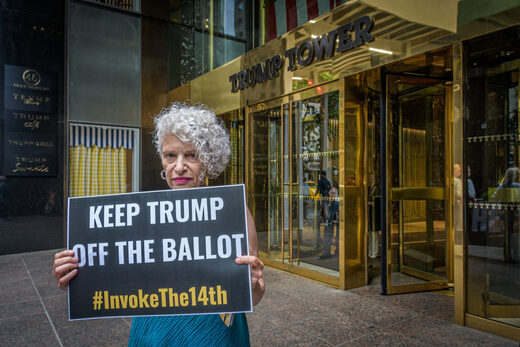 A protester holds a sign outside Trump Tower in Manhattan to demand state governments to disqualify former President Trump from appearing on ballots in 2024 under the 14th Amendment. The group stated that secretaries of state are empowered by the 14th Amendment to bar Trump from running for office because of his incitement of the January 6, 2021, Capitol attack. (Erik McGregor/ LightRocket via Getty Images) Donald Trump’s engagement in insurrection and providing aid and comfort to insurrectionists disqualify him from holding the office of U.S. President again. The Fourteenth Amendment, Section 3 of the U.S. Constitution, states the basis for this disqualification.
The Congress added this Amendment to the U.S. Constitution following the Civil War. Congress believed that people who had broken their sworn oath to the Constitution should not be allowed to hold office in another political office requiring an oath to the Constitution. Although the insurrectionists to which this disqualification applied were former soldiers or officials of the Confederacy, they were neither tried nor convicted for their service.
Some observers contend that the law, as codified in the U.S. Constitution, should be ignored because the voters should decide who should be President. But voters, through their elected representatives, decided that insurrectionists who have broken their oaths should be disqualified from holding political office. To ignore the disqualification for insurrection directed by the Fourteenth Amendment is to ignore the rule of law. As the U.S. struggles to maintain the rule of law in the face of some citizens who have openly turned their back on it, government officials cannot appear to ignore a law fundamental to democracy. Snubbing our laws also shows the world that we do not respect them, making it difficult for us to propound following the rule of law for other countries. Observers also argue that this disqualification should not apply to Trump because he has not been convicted or even charged with insurrection. Although using criteria for disqualification from holding the Presidency does not rely on a judicial determination, the courts will weigh in on whether Trump is qualified. Just as voters did not have the opportunity to elect Barak Obama to a third term because he was disqualified from holding office for more than two terms, voters should not have the opportunity to vote for an insurrectionist. Voters decided that Trump, after one term as President, should not be President again. Trump and his followers showed their disdain for the outcome of that election and turned to force and deception to overturn it. Some of the same observers who call for ignoring Trump’s insurrection also note that he should not be disqualified because his supporters may engage in further violence! Trump and his supporters now argue that they did not engage in insurrection. Instead, they say that they were peacefully demonstrating. The evidence of insurrection, however, exists not only in what happened on January 6 but also in the planning that occurred in the weeks leading up to January 6 and Trump’s refusal to call for the insurrectionists to stop their violence. On January 6, Trump called for his followers to prevent the transfer of the Presidency to Joe Biden. Moreover, after January 6, as the Department of Justice sought to hold insurrectionists accountable, Trump gave aid and comfort to them by promising to pardon those who have been tried and convicted of crimes related to the insurrection if elected. Most legal scholars who have looked at the evidence already presented by the House January 6 Committee are convinced that Trump is an insurrectionist. Moreover, the legal analyses of prominent jurists, including conservatives, have found no wriggle room in the textual and originalist interpretation of the Fourteenth Amendment, Section 3. Because the six conservative justices have all justified their extreme decisions on some form of textualism and originalism, they may find it difficult to ignore its dictates. If the conservative justices appear to disregard the judicial philosophy undergirding their decisions, then the Supreme Court will lose some of its legitimacy. Alternatively, if the Supreme Court avoids the disqualification question and decides on procedural grounds, the court will also lose legitimacy. Besides being what the Constitution calls for, disqualifying Trump may be a way to reduce anger and remedy some of the illegitimacy now facing the court. Trump can petition Congress to overturn his disqualification as prescribed in Section 3. And there is ample reason to think such an application would succeed. Although Republicans hold the House by two votes and are in the minority in the Senate by one vote, many Democrats could be willing to support removing the disability of disqualification. First, some Democrats think Trump should be on the ballot. Many Democrats believe that removing Trump from the ballot will outrage his voters. They believe the only way to defeat Trump’s influence in American politics convincingly is to beat him at the polls. They should be expected to vote to remove Trump’s disability. Second, other Democrats believe that Trump would be the easiest Republican for Biden to defeat. They also can be expected to vote to remove Trump’s disability. Third, most Democrats and Republicans want the House to reach a deal on funding for the Ukraine, Israel, and the U.S. budget to prevent a government shutdown. Removing Trump’s disability could be the basis for the agreement that hardcore Trump supporters would want. Disqualifying Trump could have less impact on Trump than on the Supreme Court. Because Congress can remove Trump’s disability, the Supreme Court may stand to lose the most. But the Supreme Court is unlikely to uphold the law and disqualify Trump on substantive grounds. The six conservative justices have shown that they view the result of judicial decision-making to be a way of implementing Republican policies. Alina Habba, one of Donald Trump’s lawyers, greeted the Supreme Court’s decision that it would determine if Trump was qualified to be on states’ ballots with confidence that Justice Brett Kavanaugh would repay Trump. Trump nominated Kavanaugh to the Supreme Court in 2018. Trump also appointed Neil Gorsuch and Amy Coney Barrett to the Supreme Court in 2017 and 2020, respectively. Habba did not express that Gorsuch and Barrett would repay Trump. Apparently, Habba was commenting on a debt Kavanaugh owed Trump for confirmation.
Habba did try to clarify her remarks by remarking on how hard Trump had to fight for Kavanaugh. But the fight to salvage Kavanaugh’s nomination was carried out by the Senate. Trump’s involvement in the nomination fight was limited except in one area. After Kavanaugh was accused of attempted rape and at least one other sexual assault, the FBI was called on to investigate the charges as part of its background check. The FBI failed to interview Kavanaugh, his attempted rape accuser Christine Blasey Ford, a witness to the alleged attempted rape, and any of the other victims of the alleged sexual assaults. The FBI also failed to interview witnesses to other alleged incidents of drunkenness and sexual misconduct by Kavanaugh. The FBI initiated a hotline for people with information about possible Kavanaugh misbehavior. Although the hotline received over 4500 tips on this hotline, the FBI failed to follow up on any of them. FBI Director Christopher Wray claimed that the FBI was limited in its authority to investigate Kavanaugh. According to Wray, the FBI had to follow White House instructions in its investigation of Kavanaugh. While some Senators question the interpretation of the Memorandum of Understanding between the White House and the FBI, Wray allowed the White House – Donald Trump – to dictate the terms of the investigation. It seems clear now that Habba was referring to the debt that Kavanaugh owed to Trump for squelching a robust investigation. Did Habba know she was warning Kavanaugh that he had an obligation to repay? There was skepticism that Joe Biden would be able to enact the program on which he ran. Biden has accomplished more in his first term than most other presidents have been able to achieve in two terms. Even the most cynical pundits admitted that his performance as President has been outstanding. Nonetheless, some critics, mostly Republicans and some centrist Democrats, have criticized Biden for spurring inflation by spending too much to mitigate the effects of the pandemic, poorly executing the extrication of the U.S. from the war in Afghanistan, and failing to stem the flow of undocumented immigrants crossing the southern border. Considering Biden's significant successes and despite these setbacks, Biden decided to run for reelection. And the criticism of Biden increased, mediated by his age. 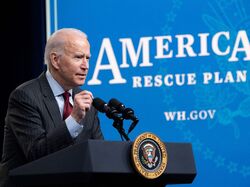 President Biden introduces American Rescue Plan - Wall Street Journal - March 6, 2021 President Biden introduces American Rescue Plan - Wall Street Journal - March 6, 2021 Biden inherited the pandemic that the previous administration had failed to stem. While that administration had enabled the development of effective vaccines to curb COVID-19, it had not developed a plan to disperse them. Biden successfully got at least one vaccine into the arms of 85 percent of Americans older than 12. However, the onset of the COVID variants Delta and Omicron and a targeted political campaign against efforts to mitigate the pandemic decreased the credit Biden received for his efforts to end the pandemic. In addition to Biden's efforts to tamp down the pandemic, he passed the American Rescue Plan. The primary purpose of the American Rescue Plan was to relieve some of the ill effects Americans had suffered from the pandemic. The help provided by the Plan included the following:
In addition to the American Rescue Plan, Biden has shepherded four other signature pieces of legislation through Congress. The Inflation Reduction Act (IRA), a scaled-down version of the Build Back Better Act that Biden initially introduced but failed to obtain the Democratic votes needed to pass it, fought inflation by reducing the federal deficit while increasing consumer access to certain goods. The IRA aimed to reduce greenhouse emissions by growing jobs in green energy technologies. It also lowered prescription drug costs for consumers on Medicare. It also raised $300 billion in new revenue by increasing corporate taxes and raising tax revenues by providing $80 billion to the Internal Revenue Service to increase its efficiency. Biden also passed a bipartisan $1 trillion infrastructure bill to improve the nation's communication and transportation capabilities. The CHIPS and Science Act of 2022 provided $53 billion to improve the nation's ability to manufacture semiconductor chips in the U.S. and prevent chip shortages due to the pandemic. Biden was also able to move the first gun safety legislation through Congress in decades, although its scope was more limited than gun safety advocates wanted.  From: The Council of State Governments - https://www.csg.org/2022/08/16/understanding-the-inflation-reduction-act/ From: The Council of State Governments - https://www.csg.org/2022/08/16/understanding-the-inflation-reduction-act/ Despite these many legislative successes, including nurturing an economy that is arguably the best since President Lyndon B. Johnson's and the Democrats' ability to hold the Republican control of the house to under six, Biden's decision to seek reelection has not been enthusiastically received. Although many Democrats expected Biden to seek reelection, especially if he was running against Trump, some expected Biden to step down because of his age. Because Biden's performance in the polls has declined, those who wanted him to step down have had strong evidence that he should have done so. In the six battleground states that President Joe Biden won in 2020 and needs to win in 2024, recent polls show that he is trailing Donald Trump by an average of 48 to 44 percent. Polling trends also suggest that Biden's approval is falling, and his disapproval is rising. These stark polling results are consistent with a trend showing Biden either running behind or slightly ahead of Trump. Biden's loss of support among blacks and young voters is crucial to this polling trend. The decrease in black support is problematic because the last three Democratic presidents relied on a solid showing by black voters for their victories. And support among young voters seems to be falling for two reasons. First, young voters, especially Progressives, are disappointed in Biden's support of the Israeli government's disproportionate violence against Palestinian civilians. Second, young voters are disappointed in Biden's failure to secure more significant relief than he has from the burden of student loans. As a result of these developments, many Democratic strategists and supporters are warning of Biden's defeat in the general election and calling for a Plan B. Some of the B plans that have been cited include convincing President Biden that he should drop his plans for a reelection run in 2024, encouraging other Democrats to primary the President and support the third party "No Labels" effort to defeat both President Biden and Trump in the general election. Except for the efforts of a few columnists, there have been no widespread attempts to persuade President Biden to end his reelection bid. The primary objection of these columnists to Biden's reelection is his age. They cite polls that show voters are concerned about Biden's age.
Members of the "No Labels" Party, a third party, claim to have a Plan B, according to Mark McKinnon, a former Republican strategist. Suppose Biden persists in his bid for reelection despite floundering poll numbers. In that case, McKinnon says the No Labels Party will run Republican candidates like Pat McCrory, former North Carolina governor, Doug Ducey, former governor of Arizona, and Brian Kemp, governor of Georgia, in pivotal battleground states. Presumably, these Republicans would draw votes from Trump rather than Biden. If the No Labels Party can only siphon enough votes so that the Biden and Trump are tied in the Electoral College, they may throw their votes to the candidate offering to grant their policy goals. There are two problems with this Plan B. First, there is no guarantee that the Republicans who might be expected to vote for Republican governors would draw votes from Trump rather than Biden. Second, although No Labels refuses to disclose a complete list of donors, one is Harlan Crowe, a lifelong Republican and Justice Clarence Thomas' benefactor. No Labels may be a stalking horse for Trump and Republicans. The No Labels Party may decide to run a Democrat like Senator Joe Manchin, who would be more likely to draw votes from Biden. Alternatively, in the event of a tie, they may throw their support to Trump. Nationally known Democratic politicians are not inclined to challenge President Biden in primaries. Governor Gavin Newsome, Governor of California, and other governors, like Whitmer of Michigan, Andy Bashear of Kentucky, Wes Moore of Maryland, and Josh Shapiro of Pennsylvania, have shown no indication that they want to run against Biden. And the window in which they would have to file to get on the ballots in key states will be closed by the end of January. As a result, the Democratic Party nominee will be President Joe Biden. Like all presidential nominees, Biden has positives and negatives. His age and what some see as policy failures like the bumpy withdrawal from Afghanistan, his inability to persuade Congress to pass voting reform and student debt relief, and his apparent failure to provide humanitarian aid to the Palestinians are negatives that have annoyed many Democratic voters. On the other hand, Biden has positives as the Democratic candidate. As the incumbent President, he has an advantage that has historically led to more victories than defeats. He has put together an administration that has had many legislative successes and he should be presiding over a strong economy by the time of the election. He has rallied NATO and invigorated the democracies of Europe. He is known to the public, has beaten Trump in the last election, and voters regard him as decent. The next President will need someone with his experience in both domestic and foreign policy. President Biden is the only person who has that experience. And he has a Vice President who, despite some misgivings, will have more experience than any of her rivals and may have own her accomplishments when it is her time to run for President. There is no Plan B. There is only the Biden-Harris ticket. If we do not want a fascist dictator, we had better do all we can to make sure that voters reelect Biden-Harris. The Court's impartiality has come under attack, especially since the accession of the last three conservative justices: Gorsuch, Kavanaugh, and Barrett. Since reports of some justices' acceptance of improper gifts gained notoriety and some decisions by the Court that the public viewed as favoring ultraright groups, the public's approval of the Court has declined. Until about 2021, Democratic and Republican approval ratings of the Supreme Court were about the same: 45 percent approval. Two months after the Dobbs v. Jackson Women's Health Organization overturned the 49-year-old Roe v. Wade ruling that guaranteed a constitutional right to abortion, only 39 percent of adults approve of how the Supreme Court handles its job, while 53 percent disapprove. Distrust in the Supreme Court (53 percent) is up 22 percent since 2019. Seventy percent of Republicans, but only 32 percent of Democrats, trust the Supreme Court. Sixty-nine percent of voters feel that the Supreme Court is too mixed up in politics, up by 12 percent since 2019. The public believes the Court's decisions favor ultraright groups and do not reflect the country's values. In an unprecedented manner, Supreme Court justices are acting in ways that make it appear their decisions are being influenced by the agendas of wealthy donors. Federalist Society, co-founder and operative Leonard Leo has directed an influence campaign at conservative justices to further the agenda of ultra-right billionaires. Justices receive unreported "gifts" from wealthy benefactors worth hundreds of thousands of dollars. Even if the "gifts" do not constitute bribery legally, most legal analysts point out that they give the appearance of impropriety and favoritism. Justices' behavior has raised two questions. First, why did their billionaire donors manipulate justices' behavior and make these gifts? And second, why did the justices carelessly ignore their moral obligation to the Court and accept these gifts? Regardless of the answers to these questions, the public's view of the justices' impropriety rests on more than getting "gifts" from donors. The public perceives that the Court favors conservative donors and their ideology. The pervasiveness of the gift-giving effort suggests a systematic attempt to influence Supreme Court justices. Clarence Thomas and His Better Half 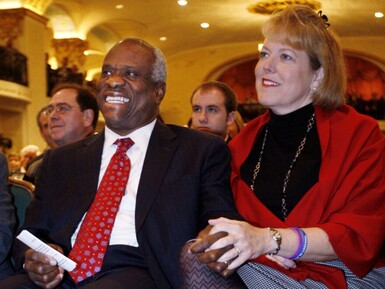 Justice Clarence Thomas and Virginia Thomas Charles Dharapak/ AP Justice Clarence Thomas and Virginia Thomas Charles Dharapak/ AP From what we know about the justices, Clarence Thomas has engaged in the most blatant wrongdoing. Beginning in 2001, Justice Thomas received gifts of a Bible owned by Frederick Douglas ($19,000) and a bust of Abraham Lincoln ($15,000). Later, in 2015, Thomas reported receiving a bronze bust of Frederick Douglass valued at over $6,000 and a "donation" to pay for his adopted son's school fees, estimated by ProPublica at $150,000. Thomas also received a gift of $267,00 for a recreational vehicle, and there is now a question of whether he has paid the appropriate gift taxes. In addition to these personal gifts, Thomas also received "vanity gifts." Harlan Crow donated $175,000 for a Clarence Thomas addition at the library in Thomas' hometown of Pin Point, Georgia. Crow later contributed $1.5 million to the Historical Museum commemorating Thoma's hometown. And in 2018, Crow gave $105,00 to Yale Law School for a Justice Thomas portrait fund. Crow also purchased a house and two nearby lots co-owned by Thomas for over $133,000, $88,000 more than Thomas reported it was worth five years earlier. Crow made $36,000 improvements in the property and allowed Thomas's mother, who had been living in the house, to continue to live in it. Despite a federal law that requires federal officials to disclose most real estate transactions over $1,000, Thomas failed to report it. Besides these "gifts," Thomas has benefitted from what may be millions of dollars from vacations and other "hospitality" worth millions. In the most exhaustive examination of Thomas's "gift" acceptance, ProPublica showed that benefactors had given him vacations to at least 38 locations. These vacations included trips around the Bahamas, 26 private jet flights, VIP passes to professional and college sporting events, and stays at luxury resorts. The people who provided these benefits were the Horatio Alger Association members who met Thomas after he ascended to the Supreme Court and was tapped for membership in that group. Thoma's wife, Virginia, a political consultant, has also had substantial earnings from dealings with members of her husband's network of benefactors. Justice Thomas did not disclose these earnings. In 2010, Ginni earned $120,000 as the head of Liberty Central, her consulting firm. Between 2011 and 2012, Leonard Leo, the head of the Federalist Society, funneled about $100,000 to Ginni through Kellyanne Conway's polling firm with instructions to keep Ginni's name from being listed as the recipient. Between 2017 and 2018, Frank Gaffney, a key purveyor of anti-Muslim conspiracy theories, paid Ginni $200,000. Justice Thomas failed to disclose this in his financial filings. One of the critical funders to Gaffney in 2017 was the pro-Trump group Making America Great, funded by Rebekah Mercer, a prominent Trump backer. Thus, hundreds of thousands of dollars flowed from Trump to the Thomas family. More important than the donations, the money Ginni has received from political networks she is a part of shreds the appearance of propriety. For example, she has used her access to her husband's former law clerks, such as John Eastman, one of the nineteen persons indicted by District Attorney Fani Willis, to advocate and recruit for ultra-right-wing causes. She has also been one of the directors of the dark money group Council for National Policy Action, which connects right-wing donors to right-wing figures and activists. In 2020, Groundswell, a group chaired by Ginni, was instrumental in vetting White House staff to detect potential disloyalty to Trump. Although the group failed to identify Lt. Col. Alexander Vindman before he testified against Trump, the group did mount a smear campaign against Vindman that undermined his career and led to his retirement from the military. Justice Thomas has not recused himself from any cases related to his wife or her political networks. Justice Thomas reported receiving hundreds of thousands of dollars in rental income from Ginni's family real estate firm over the last twenty years. That real estate firm, now known as Ginger Ltd., has not existed since 2006. Between 2003 and 2007, Ginni received $686,000 from the Heritage Foundation. Justice Thomas initially failed to list this income for his wife. Thomas said this failure was due to a misunderstanding of the reporting requirements, even though part of the job of a Supreme Court is understanding requirements. Real estate transactions are well-known for being used to hide illegal payments. They have been widely used for money laundering and to hide cash transfers for illicit purposes. Did ultra-right-wing groups use defunct real estate companies and research organizations to funnel large sums of money to two of its most influential and effective influence agents? The Slips and Missteps of Other Justices 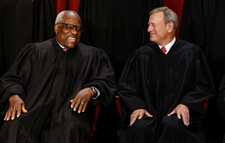 Supreme Court Associate Justice Clarence Thomas and Chief Justice John G. Roberts react during a group portrait at the Supreme Court in Washington, DC on Oct. 7, 2022. Evelyn Hockstein/Reuters Supreme Court Associate Justice Clarence Thomas and Chief Justice John G. Roberts react during a group portrait at the Supreme Court in Washington, DC on Oct. 7, 2022. Evelyn Hockstein/Reuters While Justice Thomas' acceptance of questionable benefactions may be the most glaring among the justices, Chief Justice John Roberts has not had a spotless ethical record. Chief Justice Roberts' wife, Jane, received over $10 million in fees as a headhunter for law firms pursuing lawyers who could practice before the Supreme Court. Job seekers who perform well before the Supreme Court validate the headhunter's expertise and increase the value of the headhunter's efforts. Chief Justice Roberts, thus, has an incentive to support his wife's expertise. 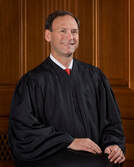 Justice Samuel Alito; Collection of the Supreme Court of the United States Justice Samuel Alito; Collection of the Supreme Court of the United States Like Chief Justice Roberts, Justice Alito has also failed to recuse himself from cases in which he and his wife had a financial interest. Appointed to the Court in 2006, Alito disclosed a $500 gift of Italian food in 2007 and noted on the filing that the bestower was unlikely to have a case before the Supreme Court. By 2008, like Justice Thomas, Samuel Alito had accepted a free luxury vacation from Paul Singer, a wealthy Republican donor. Leonard Leo arranged this luxury vacation trip. The vacation trip costs $130,000 for a jet flight to an exclusive $ 1,000-a-day fishing resort. At the time, Singer had a case pending before the Supreme Court from which Alito did not recuse himself. Another wealthy Republican donor, Rob Ackley, and a federal appellate judge, A. Raymond Randolph also accompanied Leo and Singer on this trip. Alito did not disclose this trip despite being required. Alito disclosed mineral interests between $100,000 and $250,000. After this disclosure, Alito ruled in favor of oil and gas interests, although not the specific companies in which he and his wife had interests. In 2022, Alito's wife, Martha Ann, agreed to lease 160 acres to an oil and gas company for 3/16 (almost 19%) of all the money from extracting oil and gas. Alito then concurred with the conservative majority of the Supreme Court to prevent the Environmental Protection Agency from regulating greenhouse gas emissions from power plants. In effect, Alito concurred with decisions that potentially increased his wealth.  Justice Neil Gorsuch Nicholas Kamm/AFP/Getty Images Justice Neil Gorsuch Nicholas Kamm/AFP/Getty Images Nine days after Neil Gorsuch was confirmed as a justice, he sold a forty-acre tract of land he co-owned. The property had been on the market for two years. After being confirmed by the Senate, Gorsuch sold the land to the head of Greenberg Traurig, one of the nation's largest law firms. Greenberg Traurig has an extensive practice before the Supreme Court. So far, Gorsuch has sided with Greenberg Traurig eight out of twelve times. Amy Coney Barrett sold her residence to a member of the Religious Liberty Initiative, a Catholic religious group claiming to promote religious freedom for "everyone." Brenden Wilson, the buyer, paid $905,000 for the house. The Religious Liberty Initiative has filed "friend-of-the-Court" briefs in religious cases before the Court, including Roe v. Wade. The group also funded Justice Alito's trip to Rome to give a speech after Roe was overturned. While all these activities were disclosed and thus did not violate any rules, they raised red flags. We cannot know if the prices paid for the real estate sales were inflated. We do know that real estate is notorious for hiding illicit funds. The Federalist Society: Leonard Leo's Guiding Light 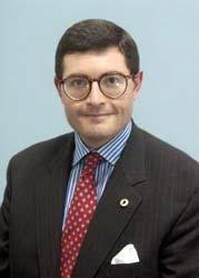 Leonard Leo Leonard Leo The Federalist Society, originally a conservative legal educational group, has developed as the preeminent conservative legal network. Leonard Leo has been the person primarily responsible for its growth and development. Leo has provided an alternative guiding light for the legal establishment by using the Society to establish a social and legal network of ultra-conservative millionaires, lawyers, judges, and legal educators. This network aims to identify conservative legal talent and provide a pipeline to more influential positions in the legal establishment. This network is also a mechanism for vetting and validating lawyers and potential justices. The validation provided by the Federalist Society ensures that justices and judges who are confirmed become firmly locked into legal conservatism. Justices whom Leo has recommended through the Federalist Society have remained steadfast conservatives. Thus, the Federalist Society is an alternative guiding light for a conservative legal establishment. The impetus for this guiding light was the perceived liberal turn of the mainstream legal establishment by conservatives. While the Society still purports to be an educational organization, its real purpose has become being a pipeline for conservative legal talent. Considering the damage some justices' unethical behavior has done to the Court's standing, commentators have questioned why they have become impervious to their ethical responsibilities. The justices' explanation for their behavior suggests they did not see accepting "gifts" from Republican donors as wrongdoing. Instead, they claimed that these gifts were exempt from being disclosed because they represented hospitality by friends. The hospitality exemption refers to stays in private homes and not staying in expensive resorts or traveling on yachts or private airplanes. The Ethics in Government Act of 1978 requires a justice to disclose most gifts. The only exception to disclosure is "personal hospitality." Under the Ethics in Government Act, the Judicial Conference, established to administer the Act for the judicial branch, clarified what "personal hospitality" meant. The Judicial Conference declared in March 2023 that personal hospitality excluded hospitality for business purposes by a corporation or organization at any place not owned by the individual or family extending the hospitality. The Judicial Conference also declared that all transportation must be disclosed. Those justices who failed initially to disclose gifts were required to amend their financial statements. Despite these requirements for disclosure, it is now clear that some justices systematically failed to comply. The Supreme Court recently adopted its code of conduct (November 3, 2023). This code says that the justices "should comply" with lower court regulations on what gifts federal judges and their families can accept. However, this code also says that each justice will ensure their adherence to the code. While some conservatives may feel entitled to ignore these rules because of their affiliation with Leo and the Federalist Society, they may also think they need not fear impeachment and removal. And impeachment and removal are the only viable punishments that can be meted out to miscreant justices. However, because the Federalist Society is an alternative social and legal network, it interprets what is legitimate. The Federalist Society and Leo believe that association between the legal establishment and wealthy Republican donors is permissible. Why the Court Is Under Attack The importance of the Federalist Society to the advancement of conservatives in the legal profession also suggests why conservative justices are willing to deviate from boundaries that mainstream justices are unwilling to trespass. The justices who have either failed to disclose "gifts" or recuse themselves from cases that involve their benefactors offer various defenses for their actions. Generally, they claim that questions raised about their failure to disclose these gifts are due to unwarranted attacks by liberals. Specifically, Justice Thomas also claimed that he was unaware that some "gifts" should have been revealed. The Code of Conduct for U.S. Judges does not apply to the Supreme Court justices. However, it does apply to all other U.S. judges and is a helpful guide for assessing the ethics of Supreme Court justices. The code says that "a judge should respect and comply with the law and should act at all times in a manner that promotes public confidence in the integrity and impartiality of the judiciary…a judge should not allow family, social, political, financial, or other relationships to influence judicial conduct or judgment." Even if the conduct of these Justices does not rise to the level of non-compliance with the law, the code says that "a judge should avoid impropriety and the appearance of impropriety in all activities." Many Americans expect such ethical standards to apply to these "Supreme" justices. The justices and their defenders also claim the rewards reaped by the justices' wives result from the meritocratic success of their independent wives. Of course, spouses must be able to maintain their careers. However, justices benefit from their spouses and thus may be tempted by their success. The amounts, purposes, and duration of the "gifts" Thomas, Alito, and their wives have accepted without disclosure make it difficult to rule out the possibility that they have been subject to attempted bribery. Why Donors Give Disguised "Gifts" Donors give disguised gifts to justices to affect the outcome of cases the Court hears. However, the preferences of the conservative justices are well known and favor the results desired by the donors. Thus, it is unclear why donors would need to give conservative justice gifts. One commentator believes that the donors gave "gifts" to the justices and their families to ensure they remain bound to conservatism. Progressive political commentator and author Thomas Hartmann has proposed that Republican donors are motivated to give conservative justices luxury gifts to ensure their continued allegiance to conservative ideology. Hartmann argues that the right wing was frustrated by the disaffection of conservative justices who became more liberal on the Supreme Court. These justices include Earl Warren, William Brennan, Harry Blackmun, John Paul Stevens, Sandra Day O'Connor, Anthony Kennedy, and David Souter. On the Court, over time, these justices voted more with the liberal justices than the conservative justices. According to Hartmann, right-wing billionaires sought to stop conservative justices from shifting to liberalism. They use their money for "gifts" to encapsulate conservative justices in a cocoon of privilege and wealth. Thus, the vacations and other "gifts" are intended to make it more difficult for the justices to renounce conservatism. Hartmann's contention that benefactors are trying to prevent conservatives from turning liberal seems powerful—some Republican Presidents appointed justices who joined liberal justices in pivotal decisions. However, Hartmann's explanation fails to consider two changes in the legal environment: the existence of the Federalist Society and the willingness of the members it advances to engage in result-oriented legal decision-making, although it means ignoring facts and pertinent precedents. The Federalist Society advances members they have vetted to ensure they share an ultra-conservative vision of Society and are willing to use their power to realize it. None of the conservative justices who joined decisions that aggrieved conservatives, e.g., Roe v. Wade, were appointed after the presence of the Society. Of the six conservative justices now on the Court, only one was not embedded and vetted by the Federalist Society: Clarence Thomas. Thomas established his bona fides by marrying the daughter of conservative parents who supported the John Birch Society and herself a conservative operative. In addition, Thomas had espoused personal animosity toward the mainstream legal establishment. Fishing trips hardly seemed necessary to keep these justices towing the conservative line. Hartmann's explanation for why donors shower gifts on Supreme Court justices is also built on the assumption that public awareness of judicial decision-making will minimize the opportunity to bribe justices. But the influence that a justice could have in influencing the outcome of a decision goes beyond his vote. When the Supreme Court is pretty evenly divided between justices who adhere to the facts and precedent and those whose decisions are intended to achieve specific results, information concerning which considerations might sway a justice is precious. Before the accession of the last three conservative justices, such information could have been critical in formulating case strategies. Justice Thomas, for example, while attending fundraising events for the group Stand Together (part of the political advocacy Koch Network), gave speeches and was present when network members were planning litigation strategies and identifying cases that could be used to bolster conservative positions in Supreme Court deliberations. Also, it is not always possible for the public to know what considerations are involved in judicial decision-making. Although justices must lay out their reasoning in reaching a decision when both sides present their arguments before the Court, there is one procedural mechanism, the shadow docket, where this is no longer done. Initially, the shadow docket was used for scheduling, issuing injunctions, and other procedural matters that were not controversial. When the Court was not in session, the shadow docket was used to grant emergency relief as in death penalty cases. Through the seventies, when a controversial case was considered, a justice assigned to the case took oral argument and explained his reasoning in his decision. Beginning in the eighties, after the Court stopped adjourning, justices started working collectively on the cases in the shadow docket. Also, they stopped holding hearings to hear evidence from both sides or considering amicus briefs. Since the accession of Justices Gorsuch, Kavanaugh, and Barrett, when the Court turned solidly conservative, it has begun to hear more cases and more contentious cases on the shadow docket than it previously had. This increase is due, in part, to the Trump Administration asking the Court 41 times for emergency relief. Without any underlying reasoning justifying their decisions, the public's perception that these decisions favor conservative ideology and donors is well-founded. In one case, the Supreme Court let stand a Texas law that barred at least 85 percent of abortions. The Supreme Court's failure to block the effect of the law was done without hearing from either the litigants or friends of the Court. Thus, the justices could not fully understand all the consequences of their failure to stay the law. During the height of the COVID-19 pandemic, the Supreme Court struck down several state regulations based on the best science available and established to protect the public's health. In Tandon v. Newsome, the Court struck down rules against at-home gatherings because the law discriminated against religion by preventing at-home bible study. In South Bay United Pentecostal Church v. Newsom, the Court struck down a law that closed indoor worship in high-infection areas. In the Roman Catholic Diocese of Brooklyn v. Cuomo, the Court stopped capacity restrictions in houses of worship. Despite the importance of these cases and Chief Justice Roberts' expressed concern that the shadow docket was being misused, Justice Alito denied that the shadow docket was being used to change the law in significant ways. The Court seems unlikely to change this procedure. More Reforms than Ethics Are Needed We expect the decisions made by justices to reflect the ideology of the presidents who appointed them, at least since the Reagan Administration. The similarity between decisions and ideology exists for two reasons. First, the justices may let their preferences guide their decisions. Second, the justices want their opinions to be consistent with their previous views. But we also expect the justices to avoid results-oriented decision-making. We also expect justices to weigh the evidence and reach conclusions, not to search for evidence or use procedures that favor groups they support, like the ultra-right Republican donors. We do not want them to appear to select outcomes that correspond to their favored groups. We do not wish them to reach decisions that favor groups they support consistently.
Many observers admit that the Supreme Court needs ethics reform. However, accomplishing reform in a polarized and evenly split political system is problematic. The Constitution, for example, presents only one remedy for wrongdoing: impeachment in the House of Representatives and, if convicted in the Senate, removal from office. Because the political system is polarized, reaching the two-thirds majority needed for conviction in the Senate seems nearly impossible. Further, political polarization means that justices are selected to advance the interests of the nominating side with the votes to confirm. Thus, the perception of fairness will be challenging to maintain. Most importantly, with a polarized government, one side may feel so aggrieved they will try to influence the Court for redress. Attempts at controlling the justices may devolve into unethical means. If the side using unethical means is also favored by some justices, the perception of actual or perceived favoritism may prevail. Any attempt at reforming the Court will have to address political polarization. One method of managing the influence of problems has been featured in the President's Commission on the Supreme Court. The nine Supreme Court justices could be rotated yearly from the pool of 180 federal appellate justices. The nine Supreme Court justices would revert to the appellate Court. Those in good standing would be eligible for random selection to either the Supreme Court or an administrative court, also randomly selected from the appellate bench, which would determine the cases to be heard. Several justices are using the Supreme Court for their benefit. Although these justices were required to disclose the "gifts" they received, in some cases, they have failed to reveal them or recuse themselves from cases involving their benefactors. The pattern of gift-giving that these benefactors employed suggests that they systematically attempted to influence the Court. The pervasiveness of their efforts to influence the justices indicates that more than ethics reform is needed. The very structure of the Supreme Court must be reformed to ensure that it will regain the esteem it once held. Donald John Trump is not normal. Normalization of Donald Trump means pretending that the usual reportorial task of describing and explaining what an interview subject says is valuable. Unless the reporter has enough information to confront Trump during an interview, Trump will evade and ignore the reporter’s questions. But mostly, Trump will lie. His lies are neither random nor aimless, although some reporters believe they are both. Also, Trump’s lies are not solely the result of a personality defect. Trump’s lies are a part of a tableau intended to achieve his goal. That goal must be exposed, explained, and tied to his lies. Trump’s “big lie” was that he won the 2020 election. But Trump’s big deceit was the reason for saying he won. He postured that he was fighting for the U.S. and the voters. He wasn’t. Despite what various pundits believe, Trump’s fight was not to assuage his bruised ego or because of his flawed personality. Instead, Trump’s big deceit provided the cover he needed to enable him and his followers to overthrow the U.S. government.
Kristen Welker’s interview with Donald Trump on her maiden voyage as host of Meet the Press was worse than a failure. It was an opportunity for Trump to damage this country further. Trump is attacking any institution that upholds the rule of law and democracy in this country. As a part of his attack on institutions that might hold him to account, he has lied about the media, the Department of Justice, Special Counsel Jack Smith, and Judge Tanya Chutkan. Welker has forgotten how, in 2016, the media, including her colleague Katie Tur, was nearly attacked by crowds incited by Trump. Welker does not know about Jack Smith’s motion to ensure that Trump’s statements do not bias a jury. Specifically, Smith points out in his motion that following his loss in the 2020 election, Trump “launched a disinformation campaign.” Now, on the run-up to his trial, Trump has used Meet the Press as a disinformation platform, with the complicity of Kristen Welker. Welker’s biggest failure was not realizing she could not treat Trump like an ordinary interviewee. He was not there to provide her with answers to her questions. And he made that abundantly clear by not answering questions that did not further his purpose for being there. For example, when Welker asked Trump what he was doing during the January 6 insurrection, Trump said, “I am not going to answer you.” Welker took his direction and moved on. Welker could have asked if he had watched the insurrectionists breach the capital, and she could have asked if he’d taken any steps to stop the actions. She could have asked several questions about the day so that he would have to refuse to answer repeatedly, or he might show agitation or say something – anything about her question. But she moved on. While Trump was unwilling to answer all of Welker’s questions, he did have points he wanted to make. First, as Smith stated in his motion, Trump used the NBC platform to taint the jury pool with lies. Also, he wanted to continue undermining those institutions that he viewed as threats to him. And finally, he wanted to show his followers that he was still someone to be reckoned with. Welker was especially helpful here by repeatedly referring to Trump and “Mr. President” and going for a stroll with him at the end of the interview. The visual was probably staged to show Welker’s “stature” as someone who could share a stage with a president. But this image was undermined by NBC. To refute some of the lies Welker could not counter in real-time, NBC recorded the interview and fact-checked Trump at the end of each segment and on a website—the need to fact-check Trump in this way instead of in real-time highlighted Welker’s inadequacy. When lies fester even for a few minutes, they can take root. And viewers were permitted to ignore that Trump was promising a time of retribution –when journalists of integrity, presumably including Welker, would be under serious threat. Although many journalists have had problems interviewing Trump, Welker’s failure is unforgivable because we should all know Trump’s game now. Trump’s interview behavior has not changed; his answers are well-known, and there are examples of reporters who have credibly interviewed him or presented strategies for handling him. Jonathan Swan has perhaps done the best interview with Trump because he persisted in asking Trump the question he wanted answered and was able to discredit any of Trump’s deflection. And Mehdi Hasan has written a book on interviewing someone like Trump. One key point Hassan made is that the reporter needs to stick to the question and not allow the interviewee to move to another topic. Of course, a reporter must resist the need to ask every question on their list, regardless of whether it makes them look shallow because they did not pose a relevant follow-up. Another point Hasan makes is that the reporter needs to know enough about Trump’s lies and dodges to counter them. Or, as Hasan puts it, the reporter must have the “receipts” necessary to show the interviewee and audience that there is a logical reason for what you are asking and that the failure to answer the question is meaningful. Jonathan Swan pressed Trump on his response to COVID while he was President. When Trump tried to evade Swann by moving on to another topic, Swan stopped him by asking follow-up questions about the previous answer. Welker should have been better prepared to press him on these issues after the January 6 insurrection and Trump’s indictments. By allowing him to avoid her questions and not asking follow-up questions, she projected a lack of understanding about the importance of this moment. Serious people know we are facing a crisis that could end this democracy. We should be able to expect more competence from our leading reporters than reading from a warmed-over list of questions. We should also be able to expect more from our public affairs programming than a frantic grasp for profits at any cost. And the trope that “our job is to make sure that the American people understand who the people in power are, what they stand for and what they plan to do” does not excuse this interview. This cliche shows how deficient the interview was. Welker did not explain who Trump is, what he stands for, or what he plans to do. We will continue to hear plaintive queries from this very network about why Republican politicians do not stand up to Trump to prevent the damage he has done. We must ask NBC executives the same question: why did the network not insist on a reporter who could probe for better answers? Most observers were gratified that President Joe Biden and House Speaker Kevin McCarthy reached a deal to increase the debt ceiling. The debt ceiling is the maximum amount Congress sets on how much the U.S. Treasury can borrow when revenues are insufficient to pay for the things the government has already bought. If the Treasury cannot borrow the difference, then the U.S. will not be able to pay its bills. Although the act was passed in 1917 to limit President Wilson's ability to issue Liberty Bonds to pay for World War I, Republicans in the House did not use it as a political tool until Newt Gingrich recognized its potential as a weapon in 1995. Gingrich threatened to refuse to increase the debt ceiling unless Democrats agreed to budget cuts in domestic programs. President Clinton refused, and the government shut down for about 26 days. Eventually, Gingrich and the Republicans accepted Clinton's budget and increased the debt ceiling.
McCarthy obtained some budgetary reductions, but not the size and scope of what the most extreme caucus members wanted or expected. Selected provisions of the agreement involve work requirements for recipients of the Supplemental Nutrition Assistance Program; clawing back unspent COVID relief funds; limiting discretionary spending for the next two years to one percent; clawing back some of the funds that Congress had allocated for the Internal Revenue Service (IRS); and providing a special allowance for an energy-related project. The bill extends the work requirements for adults aged 50 to 54 to the requirements now existing for those aged 19 to 49. This change in work requirements offset the number who lose benefits by the addition of veterans, the homeless, and people who were children in foster care who the law had previously excluded. Also, the deal claws back from the IRS $20 billion of the $80 billion the agency received from the Inflation Reduction Act. Because Congress had intended the $80 billion to beef up IRS collection efforts, the Congressional Budget Office estimated that this provision would cost the government 2.3 billion over the next ten years unless future legislation reverses the effects of the debt ceiling agreement. Finally, the agreement suspends the debt limit for two years—during which time Congress will spare us another fight over raising the debt ceiling. |
Follow my substack
[email protected] Archives
August 2024
|
